How in the world did we get here?
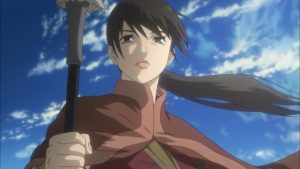 To say that the experience of “blogging” Seirei no Moribito is going to be an odd one for me is an understatement. No anime has meant more to me, and I love no other anime as much. In the anime year I hold above all other, 2007, I hold the spring season to be the best. And among that stellar and timeless group of series from that season, it’s this one that towers above all others. For me it’s the best of the best (I attempted to explain why in a piece I wrote back in 2014), the pinnacle, the standard against which all TV anime are judged. I don’t think I can be any more unequivocal than that.
To say that the experience of “blogging” Seirei no Moribito is going to be an odd one for me is an understatement. No anime has meant more to me, and I love no other anime as much. In the anime year I hold above all other, 2007, I hold the spring season to be the best. And among that stellar and timeless group of series from that season, it’s this one that towers above all others. For me it’s the best of the best (I attempted to explain why in a piece I wrote back in 2014), the pinnacle, the standard against which all TV anime are judged. I don’t think I can be any more unequivocal than that.
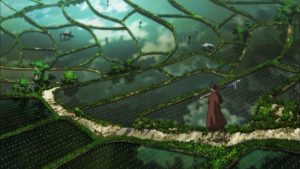 Given all that, there’s absolutely no way I can cover these 26 episodes with anything resembling impartiality. I’m a shill for Moribito – I’ve already rewatched it a couple of times and loved it more every time. Hell, when the translations of Uehashi Nahoko’s novels stalled after the second, I eventually decided to write a story wrapping up the series as I imagined it might be concluded – and that story, “Beloved”, wound up being over 82,000 words (and to this day, I’m damn proud of it – once I finally saw the ending courtesy of the excellent live-action drama, I realized I’d even gotten a few twists right). Perhaps no work of fiction in my life has impacted me as much as Seirei no Moribito.
Given all that, there’s absolutely no way I can cover these 26 episodes with anything resembling impartiality. I’m a shill for Moribito – I’ve already rewatched it a couple of times and loved it more every time. Hell, when the translations of Uehashi Nahoko’s novels stalled after the second, I eventually decided to write a story wrapping up the series as I imagined it might be concluded – and that story, “Beloved”, wound up being over 82,000 words (and to this day, I’m damn proud of it – once I finally saw the ending courtesy of the excellent live-action drama, I realized I’d even gotten a few twists right). Perhaps no work of fiction in my life has impacted me as much as Seirei no Moribito.
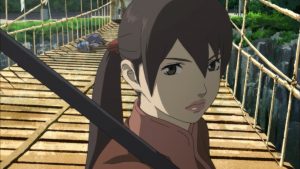 In a sense – the “Kramer-gossamer” sense – I almost worry that I’ll tarnish that perfection by trying to write episodically about Moribito. I don’t especially want to dissect this series, because for me to appreciate it as a whole is one of the privileges of my life as an anime fan. Even after having started two other 2007 shows I loved this week, my feelings were markedly different with this one. By four minutes in I was already getting emotional – not from the story, but from how beautiful it all was. The art, the animation, the music, the acting – it can never astonish me to the extent it did when I saw it for the first time, but it nevertheless retains its magic with every subsequent viewing.
In a sense – the “Kramer-gossamer” sense – I almost worry that I’ll tarnish that perfection by trying to write episodically about Moribito. I don’t especially want to dissect this series, because for me to appreciate it as a whole is one of the privileges of my life as an anime fan. Even after having started two other 2007 shows I loved this week, my feelings were markedly different with this one. By four minutes in I was already getting emotional – not from the story, but from how beautiful it all was. The art, the animation, the music, the acting – it can never astonish me to the extent it did when I saw it for the first time, but it nevertheless retains its magic with every subsequent viewing.
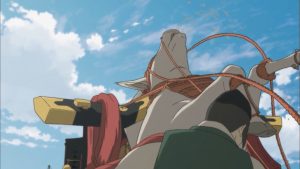 It’s worth noting that somehow I missed Moribito when it initially aired, and ended up watching it a short while later. This was the age of fansubs, and I was not as devoted an anime fan yet as I became (though it was happening quickly). Not having to wait for subs (which were by no means instantaneous with many shows, including this one) was a blessing, but I didn’t binge it. I simply didn’t want it to be over – the experience was so entrancing that I desperately wanted to draw it out as long as possible. I won’t say that ended up being half a year, but I think I made those 26 episodes last a month or so.
It’s worth noting that somehow I missed Moribito when it initially aired, and ended up watching it a short while later. This was the age of fansubs, and I was not as devoted an anime fan yet as I became (though it was happening quickly). Not having to wait for subs (which were by no means instantaneous with many shows, including this one) was a blessing, but I didn’t binge it. I simply didn’t want it to be over – the experience was so entrancing that I desperately wanted to draw it out as long as possible. I won’t say that ended up being half a year, but I think I made those 26 episodes last a month or so.
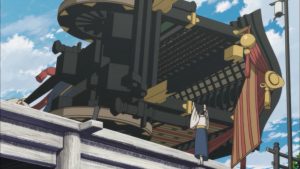 Kamiyama Kenji was the writer and director here, and while it’s easy to forget it now, he was one of anime’s leading lights at the time. Working closely with Uehashi he enhanced and deepened the first novel’s story (even incorporating some stray bits from the sequels) and IMO improved it in every way. Kamiyama was clearly working with a large budget, and the work Production I.G. did on this series is astonishing. It still looks better – markedly better – than most anime produced 13 years later. And I’m talking about the animation here – don’t even get me started on the art. From the first shots of the mountains, the rice paddies, the sky – they still move me, to this day.
Kamiyama Kenji was the writer and director here, and while it’s easy to forget it now, he was one of anime’s leading lights at the time. Working closely with Uehashi he enhanced and deepened the first novel’s story (even incorporating some stray bits from the sequels) and IMO improved it in every way. Kamiyama was clearly working with a large budget, and the work Production I.G. did on this series is astonishing. It still looks better – markedly better – than most anime produced 13 years later. And I’m talking about the animation here – don’t even get me started on the art. From the first shots of the mountains, the rice paddies, the sky – they still move me, to this day.
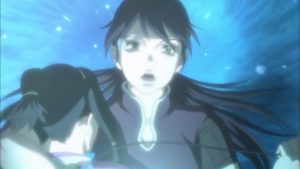 And then we have the music. Kawai Kenji is a composer with few peers in anime, a true giant of the medium. From the first strains of the rice planting song “Naji no Uta”, Kawai’s soundtrack pronounces itself the equal of the visuals. Every background track is perfection – on balance, probably my pick for best soundtrack in anime (the ED – from which my story takes its title – is also perhaps my all-time favorite, but the OP is possibly the series’ only real misstep). But then, there are so many “bests” I’d assign to Seirei no Moribito that you’ll be sick of me talking about them soon enough. Best music, best art, best relationship, best plot – even in these opening two episodes, the caliber of what we’re watching is clear.
And then we have the music. Kawai Kenji is a composer with few peers in anime, a true giant of the medium. From the first strains of the rice planting song “Naji no Uta”, Kawai’s soundtrack pronounces itself the equal of the visuals. Every background track is perfection – on balance, probably my pick for best soundtrack in anime (the ED – from which my story takes its title – is also perhaps my all-time favorite, but the OP is possibly the series’ only real misstep). But then, there are so many “bests” I’d assign to Seirei no Moribito that you’ll be sick of me talking about them soon enough. Best music, best art, best relationship, best plot – even in these opening two episodes, the caliber of what we’re watching is clear.
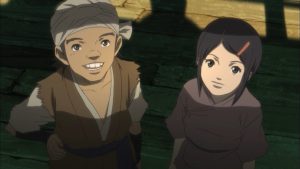 One thing which really stands out in these two episodes is how stellar Kamiyama-sensei is at exposition. This is a very complex premise, but by the end of 45 minutes we’re totally absorbed in this world and we know exactly what we’re watching. It feels so real (the setting is clearly based on Korea, as it happens), and of course a big part of that is how immediately engaging the characters are. Kamiyama wisely avoided casting anime veterans for the most part, starting with Andou Mabuki as Balsa. And he employed 13 year-old Adachi Naoto as Chagum, imparting a degree of realism that would have been impossible with an adult actor of either gender. Those two are the anchor of the series, and they anchor it flawlessly.
One thing which really stands out in these two episodes is how stellar Kamiyama-sensei is at exposition. This is a very complex premise, but by the end of 45 minutes we’re totally absorbed in this world and we know exactly what we’re watching. It feels so real (the setting is clearly based on Korea, as it happens), and of course a big part of that is how immediately engaging the characters are. Kamiyama wisely avoided casting anime veterans for the most part, starting with Andou Mabuki as Balsa. And he employed 13 year-old Adachi Naoto as Chagum, imparting a degree of realism that would have been impossible with an adult actor of either gender. Those two are the anchor of the series, and they anchor it flawlessly.
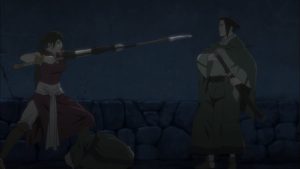 The thought of riding this emotional roller-coaster again is daunting, believe me. Seirei no Moribito will wring me out and leave me a spent husk by the time it’s finished, as it does every time. All the same, it’s hard not to queue the next episode up as soon as one ends – there’s no much greatness to come that I just want to experience it all. I’m often asked for recommendations for “something like Seirei no Moribito” but the truth is, there’s nothing – anime has never produced another show like it. You can get bits and pieces of it with other series, but Moribito is unique – a testament to the fact that at its very best, anime can produce art that takes a back seat to no medium. It’s no exaggeration to say it made me the anime fan I am today.
The thought of riding this emotional roller-coaster again is daunting, believe me. Seirei no Moribito will wring me out and leave me a spent husk by the time it’s finished, as it does every time. All the same, it’s hard not to queue the next episode up as soon as one ends – there’s no much greatness to come that I just want to experience it all. I’m often asked for recommendations for “something like Seirei no Moribito” but the truth is, there’s nothing – anime has never produced another show like it. You can get bits and pieces of it with other series, but Moribito is unique – a testament to the fact that at its very best, anime can produce art that takes a back seat to no medium. It’s no exaggeration to say it made me the anime fan I am today.


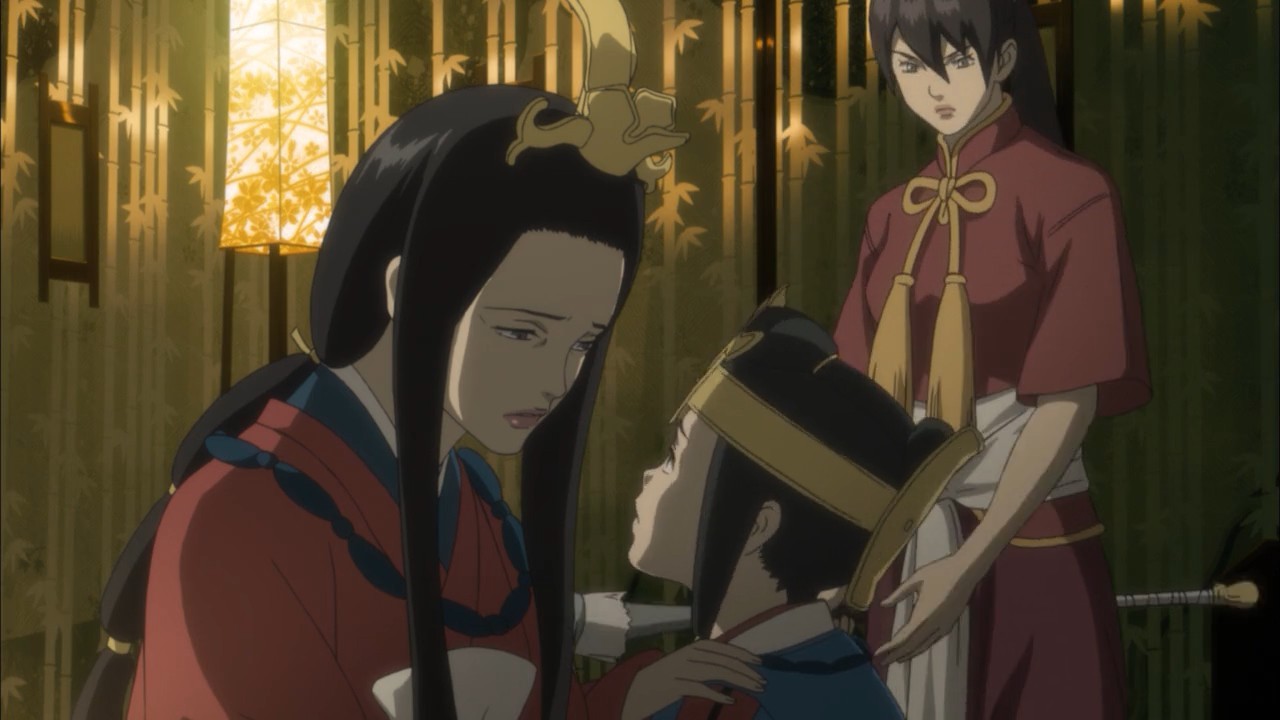
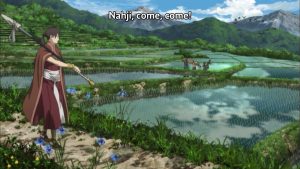
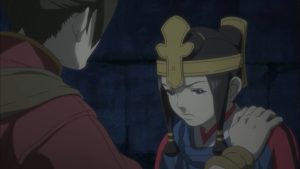
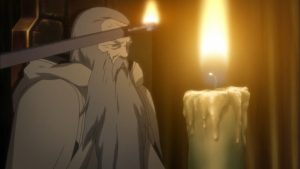
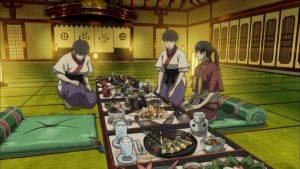
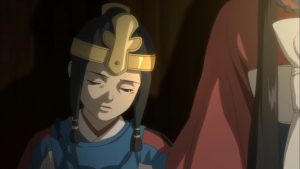
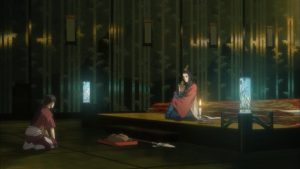
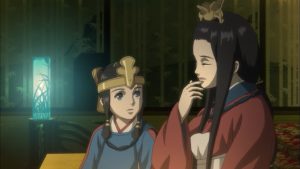
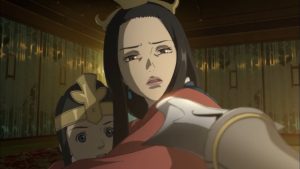
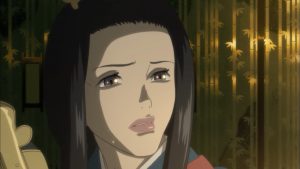
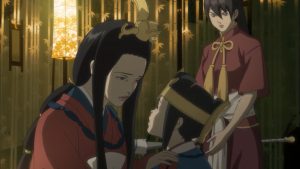
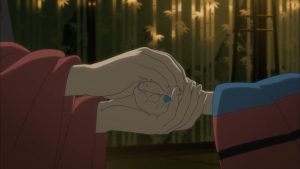
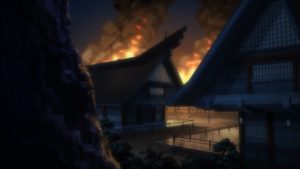
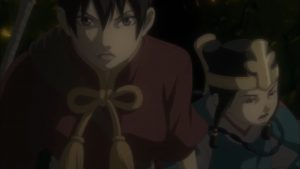
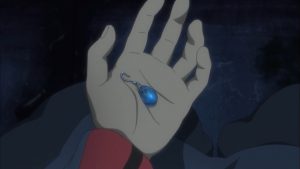
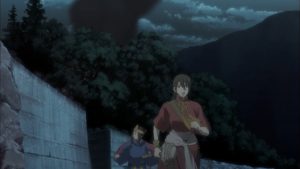
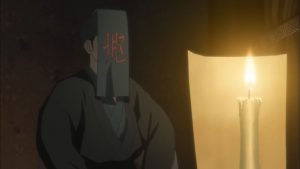
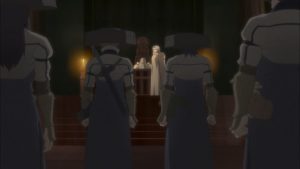
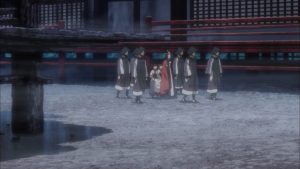
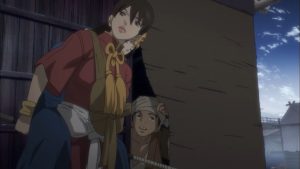
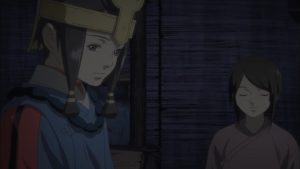
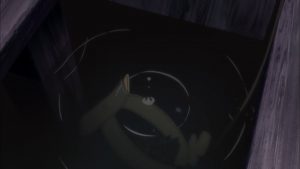
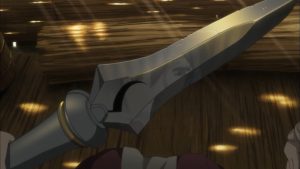
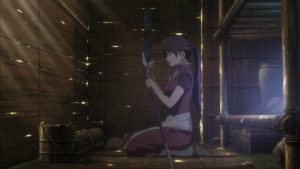
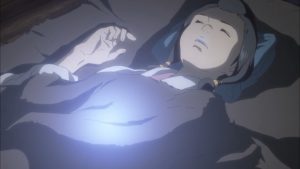
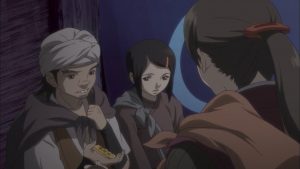
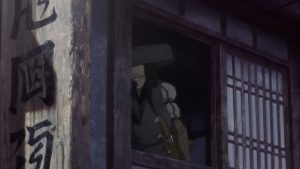
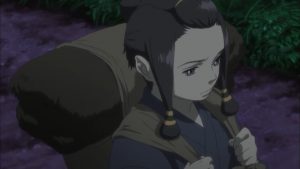
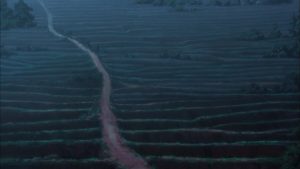


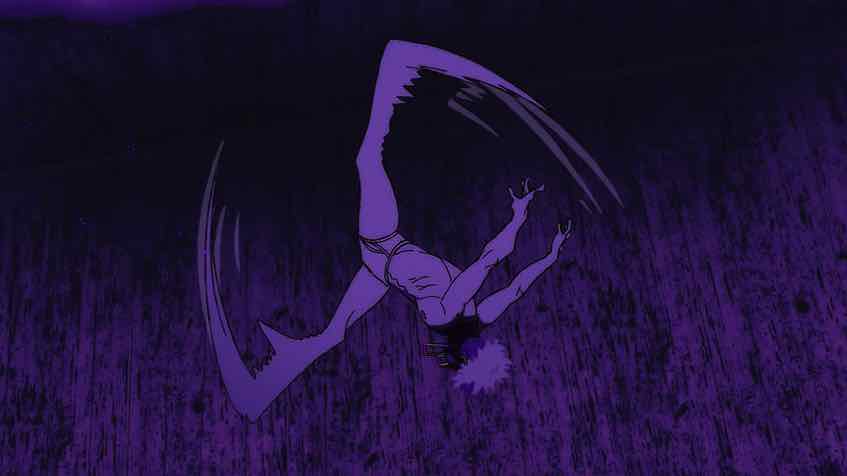
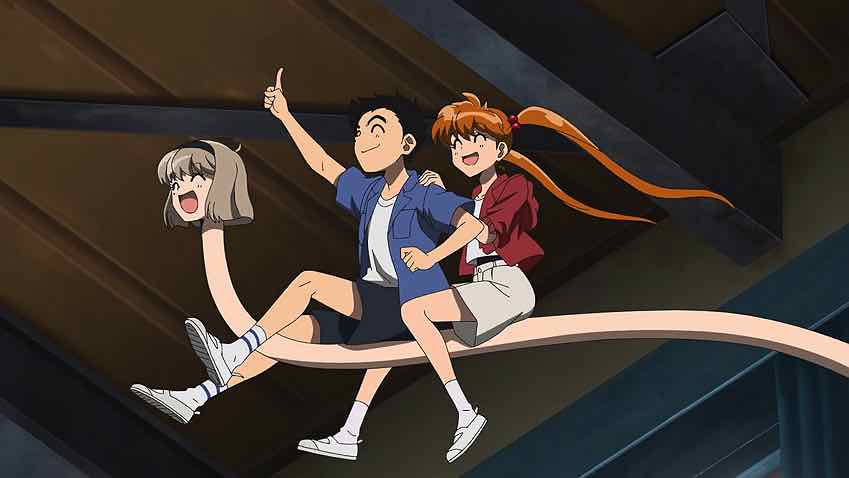
elianthos80
May 7, 2020 at 1:05 am:,3 Bravo! Bravo! *applause* to this day it still makes me weep how little known the series happen to be.
Among my 3 dearest anime series of all times it’s ‘objectively” the most well-rounded one as it has the full package from beginning to end: story, characters, dynamics, visuals, layers, message. I might not be as enamoured by (of?) single tracks (outside of Naji No Uta ) as paradoxically speaking they blend with the story so well they sorta disappear for me and I can’t recall a single theme that really stand for me outside of the bird song, but for this same reason you might argue it’s the best OST I guess.
Looking forward to you covering the rest of the episodes.
P.S.: for the passing LiA readers Beloved used to be (and still is?) published on fanfiction.net btw ^^
Guardian Enzo
May 7, 2020 at 10:27 amAnd also privately hosted. I can provide a link of anyone actually wants to read it.
Zol
May 7, 2020 at 1:38 amThank you so much for blogging this show. I only watched it in January 2016 for the first time (I also didn’t want to binge it, but only managed to strech it out for probably about two weeks), but it is one of my favourite shows since. I liked everything about it, art, music and how pretty much every character was ambivalent and not simply “good” or “evil”. I also like the eventuall villains/threat and its design a lot.
It happens that I rewatched the series just 2 months ago, so my memory will be pretty fresh when I read your thoughts on it. I’m really looking forward to it 🙂
sweejen
May 7, 2020 at 3:37 amI have such enjoyable memories of watching this with my kids a few summers ago, hunkered down in our cool house for a few days when it was too hot to do anything outside. I think it’s time for a repeat!
Robert Black
May 7, 2020 at 9:50 amHow did you like the live-action Moribito? I thought they rushed the first book, but maybe that’s because I’d already seen the anime cover it over 26 episodes. The second and third books were spectacular, though.
I also liked Kemono no Sou-ja, also by Uehashi. Medieval-like fantasy stories don’t have a lot of scientist nerd girls, so Erin is special to me. A lot of people objected to the family-friendliness of the anime version (and having read the novel now, I can understand why) but as a children’s writer myself, I was okay with it.
Guardian Enzo
May 7, 2020 at 10:25 amI thought the live was excellent. One reason why the first novel seemed faster is because it was more faithful – the source material would never need 26 episodes. Kamiyama added a good deal of detail and depth (all of it superb). On balance the casting in the live was good – it lacked the omnipresent English panto overacting you usually see in doramas.
Erin is very solid, but it doesn’t move me like Moribito does. The novels aren’t as good and neither is the anime, IMHO. Good, but not sublime.
Panino Manino
May 9, 2020 at 9:51 amI know about the live action but didn”t watched. People like Guardian say it’s good, but seeing the characters are real actors wasn’t something that I desired to see, and there’s no way for the art to match the budget liberty an animation allows.
But if you want to see more of the story I also recommend that you watch the live action.
But like he explained, the first book was greatly expanded in the anime, with parts added like the scenes with Chagum’s brother and histories that came from other books in the series.
Guardian Enzo
May 9, 2020 at 10:29 amIf you wanted to see in English how the novels continued/concluded, the drama was the only way (once it was fansubbed). For me, it was also a matter of seeing how much I put in my version crossed over with the original.
Panino Manino
May 8, 2020 at 10:10 amThe only blemish in this production is the sound effect of the weapons clashing. Always sounded odd to me.
It’s a little annoying during those wonderful fight sequences, that actually looks like actual fights (the build up and tension included). A real shame that we didn’t had the pleasure to watch Balsa owning everyone in the second book. Remember that scene with her tied at the tree? You know that Balsa will escape and kick ass, but when you see how they “helped” her you start to feel pity for how much they’ll suffer from their mistake.
Anyway, years ago I tried to participate in a fansub to force myself to learn more english, because of this I also have a small story involving Moribito. I loved the anime and at some point I got the desire to “improve” the subtitles using the books I had imported (the first one I had to burn and since then my country’s currency lost it’s value). I compared the official BD subtitles with the fan translation (in english) and the english book, and made an effort to pick all those names of places and titles and supernatural beings and find what they actually meant and translated to something that made sense. But I never finished fulling translating the last episodes, unfortunately. Work, depression, aegisub bugs, dog dying, needing to learn better english, all took it’s toll. But if I’m not wrong I believe I have the files saved somewhere…
All this just to said that this work made me appreciate the anime more, because I paid more attention to the music. Not only the open and ending lyrics are beautiful, that “Nahji” music from the first scene says a lot about what’s about to happen in this story. Also, it’s funny when you think about this. During the last arc there’s all that desperate work by the sages to uncover some old lost information that can save the day, they have to literally did at the bottom of the well… because their institution actually sits above their knowledge, because that’s what their institution do, hides and covers buries knowledge. Meanwhile the information and wisdom they were so desperately searching for was out there in the open field being singed by children! Interesting to see how people can become more ignorant in their search for knowledge.
Guardian Enzo
May 8, 2020 at 10:18 amTo your last point, Uehashi was 100% making a statement there. She’s an anthropologist – she understands how human societies process information.
Panino Manino
May 9, 2020 at 9:59 amYeah, I discovered this when I watched her interview.
I watched the two episodes now and other thing that became apparent, maybe, is how the Yogo Empire is similar to the Yamato Empire.
They’re outsiders, that came to rule the native population based on a legend that gives them divine status. “If you look the royalty in the eyes you fall blind”, it’s very similar to how the japanese emperor used to be treated.
The scene with the Shuga and the Holy Sage is also the shows why this story is so good.
They aren’t bad people, what they’re doing isn’t evil. They are genuinely doing what they truly believe needs to be done for everyone’s good. It’a a struggle between people trying to do right, and there’s a real danger that not killing Chagum may bring catastrophe. There’s no clear solution at this point.
Yeni
May 11, 2020 at 6:05 amAhhhhh Seirei no Moribito :”)
I love this series to this day SO much, such a crying shame that people don’t really know about. .. I’ve tried to make my friends watch it over the years with mixed success… their loss
There’s truly something special about Balsa (how you come up with a protagonist like her) and Chagum, as characters, their relationship, their eveything… even the secondary characters are so compeling…
You’re my absolute favorite anime blogger so reading you insight (and in Gurren Lagann too ) will be a treat ❤
Guardian Enzo
May 11, 2020 at 9:49 amD’aw… Thanks so much for saying that.
Moribito is one of the few series I’ve ever tried to get muggle family or friends to watch. Mixed success, as you say, but generally once people saw it they were impressed even if they weren’t anime people.
Snowball
May 12, 2020 at 5:18 pmI’ve been meaning to watch this show for some time ever since you mentioned it in your Dororo posts. Thanks to Covid-19 I managed to finish the series last week, and, boy, the experience was love at first sight. It was an emotional ride from start (I was welling up just from the opening credits) to finish.
This series was truly exceptional with stunning visuals and animation, excellent characters and a breathtaking soundtrack that complemented the series perfectly and was, dare I say, on the same level as Joe Hisaishi’s works. This is not the Kawai Kenji that I’m used to, I know he composes for a lot of action and sci-fi series, so this was a pleasant surprise and I have to admit that I have underestimated him.
The characters and the relationship between them, as you mentioned, are all excellent. I would like to give Toya a special mention but at a more appropriate time if you are reviewing the rest of this series.
As for the story, like you mentioned in Dororo, it’s pretty straightforward, traditional storytelling. It had a timeless quality to it that I didn’t think I was watching a series over ten years old. All the episodes contributed to the overarching plot, but each one was so riveting on its own.
Overall, I’m embarrassed to say that I’m late to the party but it’s a case of better late than never. Thank you for the recommendation and sorry for stealing your words.
Guardian Enzo
May 12, 2020 at 6:05 pmHey, I was late to the party too – like I said, I missed it when it first came out. Moribito’s greatness is forgiving – it’s open to anyone who cares to discover it.